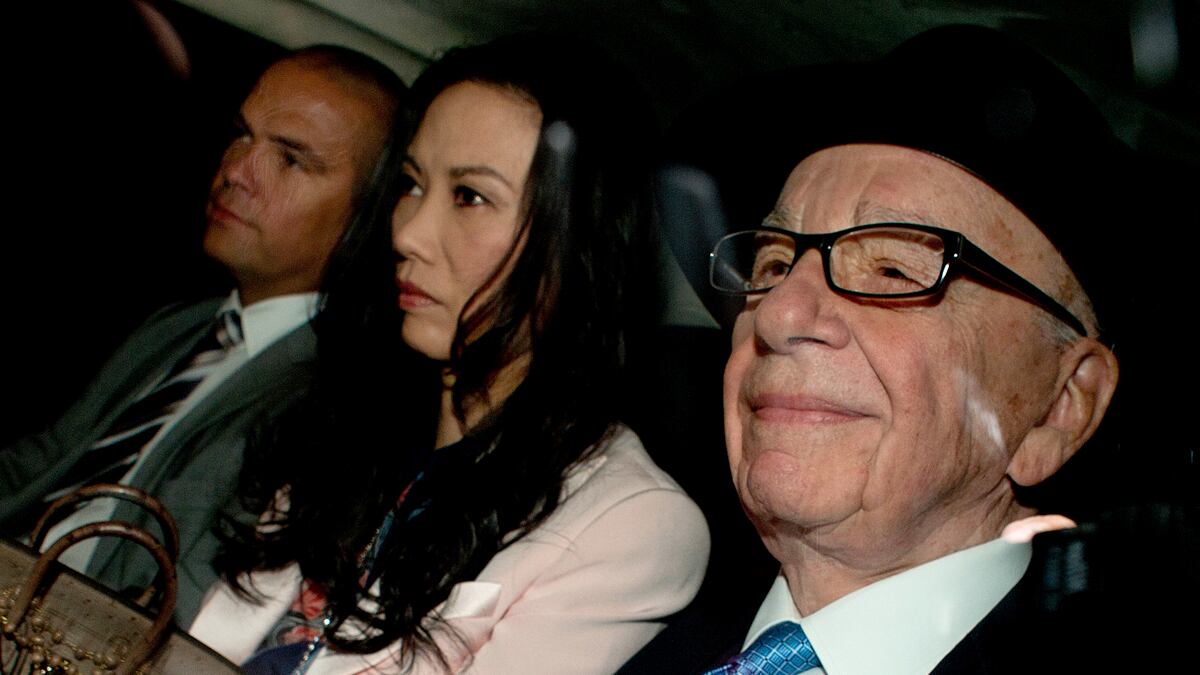On the opening night of the News Corp. retreat in Sun Valley in 1997, a bizarre sight greeted the executives and editors brought together to celebrate the company’s success and to squander some of the $1.8 billion its Fox movie division made from James Cameron’s Titanic. Above the lawn where bigwigs from around the world were gathered, actors dressed as American Indians, with long feather headdresses and war paint, emerged from the hilltops and began their slow descent.

Leading them was an uncomfortable-looking Rupert Murdoch, cast as the chief-of-chiefs, who, when the absurd ceremony was complete, addressed his staff. “Don’t be naive,” he warned them. Reporters from rival news organizations had been sent to file critical stories, he said. Everyone should watch what they say lest their offhand remarks be twisted and damage the company.
It was classic Murdoch: like Richard Nixon, he is cautious, competitive, deeply cynical, and strongly laced with paranoia. He is proud to be an outsider, beyond reach, unaffected by the social pressures that affect normal mortals. He cannot disguise his longstanding antipathy toward the British. Above all, he does not like to be thought jejune.
Back in July, when summoned by Parliament to explain phone hacking committed by his employees, he had assumed a modest persona. “This is the most humble day of my life,” he confessed. But appearing before the inquiry into press standards presided over by Lord Leveson in London last week, the wily Murdoch tried to appear candid and charming but let slip his dark side. “I have never asked a prime minister for anything,” he insisted, with a flash of menace. Murdoch was back on the offense.
Sure, prime ministers and politicians may have fallen in line with his business goals, but that was their affair, he said. If there was any wrongdoing, it was people like Tony Blair and David Cameron who were to blame because they, not he, were elected to represent the people’s interests. He put News Corp. first. If politicians were too callow and craven to resist him, too bad.
The facts tell a different story. Murdoch says Cameron went “out of his way to impress” when he was flown to see Murdoch on his yacht before the general election of May 2010. Since the election, Cameron has consulted with Murdoch seven times. Murdoch says such exchanges are “part of the democratic process,” but such was the prime minister’s embarrassment at being seen taking orders that the 81-year-old tycoon was asked to use the back door because “[they] don’t want me photographed going out the front door.”
For those who have watched Murdoch at close quarters, his belligerent attitude came as no surprise. He is a lonely, headstrong figure, used to getting his way, and is furious not only to have been frustrated in taking the remaining 61 percent of the British satellite broadcaster Sky that he does not already own, but finding himself being challenged by lawmakers and government lawyers over whether he is a fit and proper person to own and run a media company. The nerve!
The full scale of the horror at the heart of Murdoch’s British empire has yet to be fully understood in America, where he is seen as a media magnate like any other, except, perhaps, for the scale of his success. He has created a fourth television network; founded Fox News, the engine of the Republican Party; turned Fox studios into a profitable powerhouse with blockbusters like Titanic and Avatar; and transformed the once-dowdy Wall Street Journal into a lively general-interest paper.
The rapid growth of his media empire, however, stems from the vast revenue provided by his milk-cows in Britain, The Sun, The Sunday Times, and Sky. These are his pride and joy and the objects of his closest attention. In a world where print is being eased out by digital, he remains devoted to the power and influence of paper and newsprint.
He has always kept close tabs on his papers and keeps his beta-male editors on a short leash. As former Sunday Times editor Andrew Neil put it, “You are a courtier at the court of the Sun King, rewarded with money and status by a grateful King as long as you serve his purpose, dismissed outright or demoted to a remote corner of the empire when you have ceased to please him.”
It is the behavior of his U.K. papers that have made him a pariah in Britain today. Under the guise of cheeky, daring, dashing tabloid journalism, Murdoch has presided over widespread criminality. Scoops have not been discovered, they have been stolen. Politicians who have dared stand in his way have been spied upon, had their phones intercepted by his detectives, and then found their peccadilloes splashed across his front pages. Murdoch’s papers have been running a protection racket, pure and simple: do as we say or face the consequences.
Among the illustrious roll-call of victims are princes William and Harry; former prime minister Gordon Brown; Blair’s wife, Cherie; and the mayor of London, Boris Johnson. Among celebrities whose private voicemails have made headlines are the manager of Manchester United Sir Alex Ferguson, Man U star Wayne Rooney, actor Hugh Grant, and Paul McCartney (singing “We Can Work It Out” to Heather Mills when she deserted him). But the crime that caused the most public outrage in Britain was the hacking of the cellphone of a murdered 14-year-old schoolgirl, Milly Dowler.
Now the former government minister Tom Watson has written a scathing indictment of Murdoch’s shady methods, Dial M for Murdoch (Penguin). He explains how he was followed by Murdoch’s private eyes, slandered to the prime minister by Murdoch’s ambitious flame-haired favorite Rebekah Wade, and been driven to deep despair. When Watson refused to play ball, he was trashed by Murdoch’s Sun, and described as “treacherous Tom Watson—a tub of lard who is … suspected of being in [a plot against Brown] up to his bloated and bulging neck.”
Watson lists the charges against Murdoch chapter and verse in a catalogue of criminal subterfuge that would put Communist East Germany’s Stasi secret police to shame. Murdoch is blamed for: allowing the routine bribing of police and public officials to buy stories; paying off Scotland Yard top brass with cash and lucrative book and newspaper column contracts to halt investigations that would have blown the cover on his company’s criminality; threatening prime ministers with hostile coverage and the withdrawal of his papers’ support; and intimidating cabinet ministers to decide in favor of his businesses rather than the public interest. As Blair explained to Piers Morgan, “I had to court [Murdoch]. It is better to be riding the tiger’s back than let it rip your throat out.”
How much did Murdoch know about the quotidian phone-hacking, influence-peddling, spying and surveillance, blackmail, and coercion going on under his nose? Like Nixon, he blames what the top detective unpicking the wrongdoing calls a “culture of illegal payments” in his company on everyone but himself. The scandal was “a serious blot on my reputation,” he complained to Leveson. “Someone took charge of a coverup, which we were victim to.” His son James, he claims, who was nominally in charge of the papers, was too “inexperienced” to counter the coverup.
Murdoch denies he knew that some of his most famous scoops, which were quoted at length from private phone messages, came from illegally hacked voicemails, though his top editors report he discusses and interferes in even the smallest decisions. Why did he not ask the question every editor learns in Journalism 101: where did this information come from?
Murdoch did not need to order illegal activities. As Neil points out, “You create a climate in which people think it’s all right to do certain things. And I would argue that Rupert Murdoch with his take-no-prisoners attitude to journalism—the end will justify the means; do whatever it takes—created the kind of newsroom climate in which hacking and other things were done with impunity on an industrial scale.”
It is only a matter of time before the Murdoch scandal breaks in the U.S. The New York Post, run by Australian and British journalists who work to a different standard than their American counterparts, is as feared in Manhattan as The Sun is in Britain. They operate an identical system of gossip-based intimidation to call politicians and celebrities to account. It runs vicious vendettas that target a blacklist of individuals who have fallen foul of Murdoch.
Justice Department and SEC investigators are exploring allegations of “a pattern of illegal activity [that] involve[s] thousands of potential victims” by News Corp. employees, after Senate Commerce Committee members Barbara Boxer (D-CA) and Jay Rockefeller (D-WV) demanded to know whether Murdoch’s company had broken either the Foreign Corrupt Practices Act, which “prohibits corrupt payments to foreign officials for the purpose of obtaining or keeping business,” and/or the Wiretaps Act, after reports that Murdoch papers hacked victims of the September 11 attacks.
“Rupert Murdoch wanted to become an American citizen,” Boxer told the BBC. “He needs to obey American law.” In response to federal investigators, News Corp. has handed over 60,000 emails for them to determine whether hacking took place on American soil. If the scandal breaks on American shores, Murdoch can expect to be summoned before Congress to explain himself, and he may not be given the gentle grilling he enjoyed in London last week.
And civil cases by Cherie Blair and two others accusing News Corp. employees of doing just that are heading for court in New York. Mark Lewis, the British lawyer whose dogged determination to unpick the Murdoch scandal, despite being harassed by Murdoch private eyes who followed and secretly filmed his teenage daughters, represents “more than 10” Americans “raising issues against other [News Corp.] titles [notably The New York Post] or Fox News, not necessarily about hacking but about other untoward dark arts to obtain information that should be private.”
Does this mark the beginning of the end of the Murdoch era? Murdoch feels safe behind the defensive shareholding arrangement by which he and his family keep close control of News Corp. and its board. He and his family hold nearly 40 percent of the voting shares and operate in unison, ensuring that he will remain in charge no matter what investigators discover.
Despite this immunity from outside influence, shareholder groups such as the British-based Local Authority Pensions Fund Forum, which controls $160 billion in investments, and Christian Brothers Investment Services in the U.S. say they will file a joint motion seeking an independent chairman to replace Murdoch at the next News Corp. annual general meeting.
Murdoch once said, “The buck stops with the owner, whether the presses break down, whether there are libels in the papers, or anything else.” It will be seen whether, like his testimony to Leveson, such sentiments are mere words or whether the morality instilled in him by his father, Sir Keith, the son of a minister of the Free Church of Scotland, will eventually shine through.






